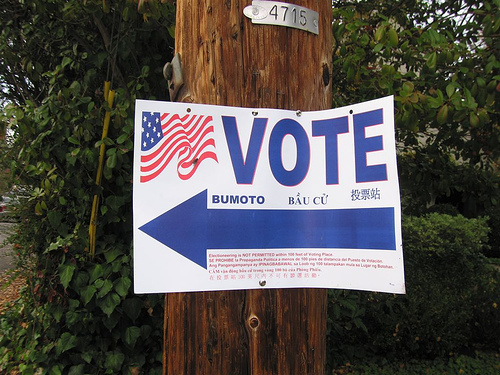On October 26 a Boston Globe headline immediately called my attention: "Many in East Boston Can't Vote on Casino Referendum." As the city prepared to elect a new mayor to replace the 20-year incumbent Thomas Menino, the permitting of a new casino in East Boston was a far more important issue for many. For some it represented economic opportunities and for others it seemed a threat, bringing unwanted traffic and vice to the region. The stakes were very high for local residents, but, as the article reported, "census figures show that almost half of the adults in this immigrant enclave will not cast a ballot about the casino, the mayoral race, or anything else -- because they cannot. They are not US citizens."
The vote went on, the casino initiative failed, but the fact that "about 46 percent of the adults in East Boston cannot vote" on matters that directly affect their livelihood and quality of life raises very important questions about democracy and representation, at least at the very local level.
We often take for granted that voting is a right and responsibility of citizens, a term that in common parlance has become closely associated to belonging to a particular nation-state. Yet the ideas of citizenship and the polis, where our modern notions of democracy were born in ancient Greece, did not necessarily originate in nations, but in cities and city-states. It is at this local level, in cities and towns, that democracy takes on its most immediate meaning. It is not surprising that the roots for both words "citizen" and "civic" come from words related to cities, not nations or countries.
City and town dwellers have a major interest in the affairs of the communities that surround them. This is particularly the case of those who have become their permanent legal residents, even if they have not earned a national citizenship. They are people who are engaged in community affairs; they are tax payers and often property owners, many with children in the local schools. Often times their children do have United States citizenship and their only way to participate in the political process is through their parents, whose obligation is to represent their offspring until they reach legal adulthood.
The Boston Globe article made me realize that in today's highly mobile society we have many citizens (city dwellers in the original sense of the word) who because of their lack of national citizenship are excluded from casting votes at all sorts of local elections and referenda, popular plebiscites in which many decisions are taken with crucial repercussions for them and their children.
I remembered having heard that in many places in the European Union foreign residents are allowed to participate in local elections. Why not in the United States? I thought. A little online research indicated that the idea is not as outlandish as it might seem at first glance. A 2003 paper by David C. Earnest indicates that a decade ago
there [were] twenty-two [nation-]states in which resident aliens [had] at least some voting rights, and two others whose constitutions explicitly permit[ed] their legislatures the discretion to enfranchise resident aliens... There [were] six states, furthermore, which [had] considered alien suffrage but [had] rejected it.
The relevance of this kind of enfranchisement is made clear by Earnest as he reminds us that
In an era of large-scale migration, democracies today host populations of aliens that reside within their borders for years -- if not decades or lifetimes -- that pay taxes, face compulsory obligations like the draft, and often share more political interests with their local neighbors than they do with the citizens in their home countries.
What became even more interesting was discovering that within the United States voting rights for non-citizen residents would not be anything new. As Ronald Hayduk has pointed out,
"Aliens" voted in local, state, and even national elections in twenty-two states and federal territories from the nation's founding until the late 1920s, and noncitizen immigrants held public offices, such as alderman, coroner, and school board member. Noncitizen voting built on the hallowed principle of the American Revolution: no taxation without representation. Alien suffrage was seen as a way to encourage newcomers to build a stake in our nascent country. As America's experience during the nineteenth century demonstrated, immigrants who declared their intent to naturalize were allowed voting rights because it encouraged integration and assimilation.
Wikipedia's article "Right of Foreigners to Vote in the United States" provides a fascinating glimpse at the range of voting possibilities for residents that have existed at different moments in this country's history.
Throughout its history our nation has prided itself about its ability to successfully integrate immigrants. The 19th century in particular is remembered as a period of great growth, creativity and development. It is easy to idealize the immigrants of the time who we are told left everything behind to form part of a new polity. Yet I would argue that much of their integration was not limited to their personal attitudes. Laws which allowed and encouraged them to participate in the political process also played a crucial role in their integration. Today many immigrants are making many efforts to participate in the political process short of casting ballots. They have voted with their feet by establishing themselves in this country. Returning to the laws that allowed them a more active participation in, at least, local elections would not only give them a voice that our democratic system celebrates, but would also more fully integrate them into a civil society that they have come to call their own and that of their children.
This post first appeared in My First Blog.
